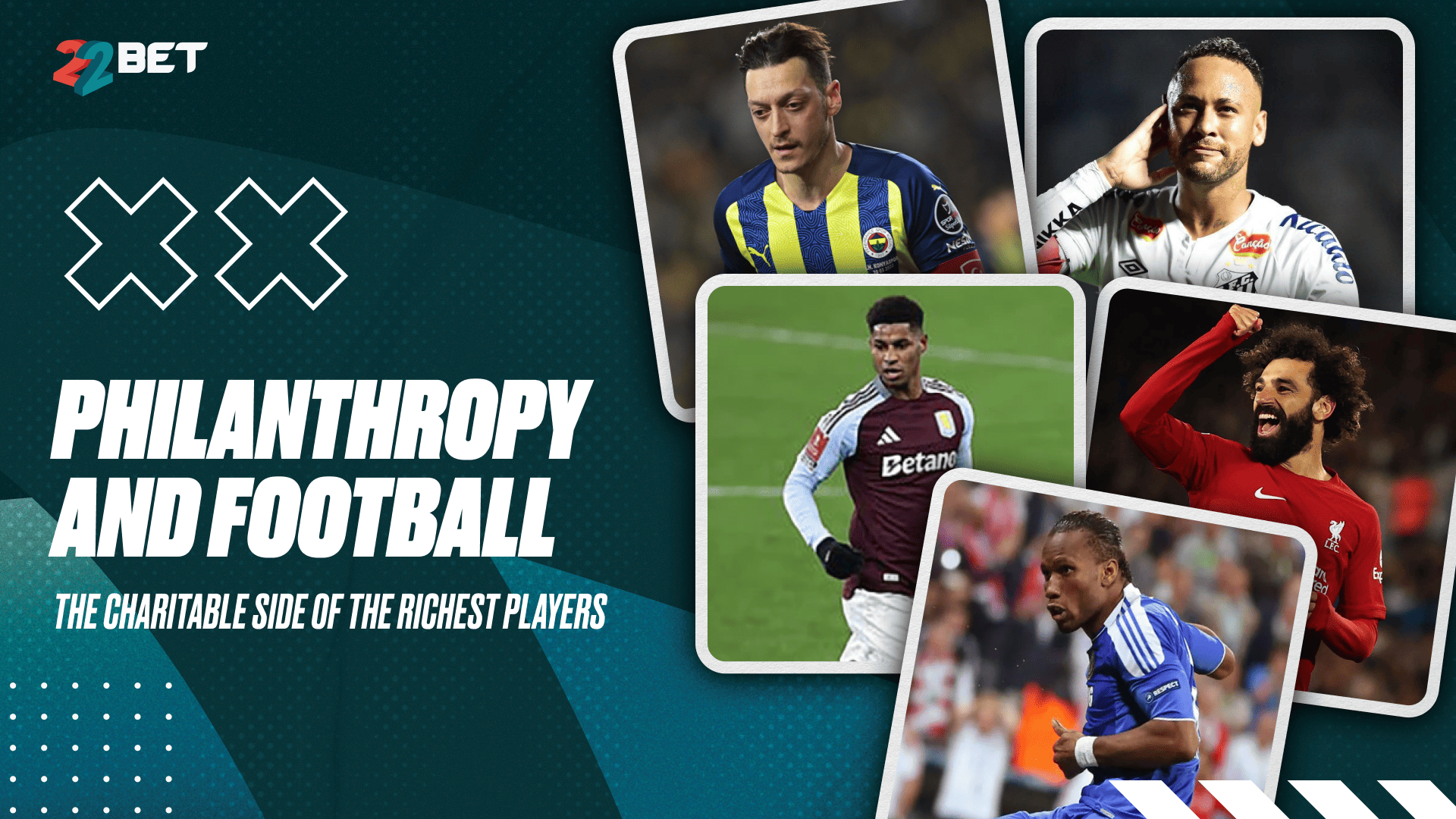I used to think footballers lived on another planet—a place filled with Bentleys, absurd haircuts, and champagne showers in gold-tiled locker rooms. Charity? That wasn’t part of the image.
It wasn’t until much later, buried in some late-night article about Didier Drogba funding a hospital, that I realised there was a whole other side to these players. A quieter, much more human one.
Some of the wealthiest footballers on Earth—men whose boots alone could pay off a small country’s debt—are doing the kind of work NGOs dream of. And they’re doing it without fanfare. No orchestral music, no slow-motion footage of smiling children (well, not always). Just action. Real, sustained, personal action.
This piece isn’t about praising footballers as saints—God knows the sport has its egos. It’s about looking at what happens when fame and money collide with memory, conscience, and a sense of responsibility. Turns out, it can be something pretty extraordinary.
Why Footballers Engage in Philanthropy
I’ve always found it interesting how footballers—some of the most hyper-visible, ridiculously wealthy people on the planet—end up doing some of the quietest good. Not all of them, obviously. But the ones who do it right? They don’t need to announce it with a 12-part Instagram Story.
There’s something undeniably honest about a player like Salah building a school in his hometown or Rashford refusing to forget what hunger felt like as a kid. It’s not polished. It’s not choreographed. It feels like they’re doing it because they can’t not do it.

TOP 8 Footballers Who Are Changing Lives Through Philanthropy
From grassroots support to global aid projects, these eight footballers prove that success isn’t just about titles and trophies—it’s about impact. Here’s a closer look at the players using their platform to lead meaningful change:
Cristiano Ronaldo
When it comes to high-profile charity work, Ronaldo’s charity efforts stand out not just for their scale but for their consistency. Over the years, he has donated millions to support causes ranging from children’s hospitals to disaster relief.
In 2012, he covered the full cost of brain surgery for a 10-month-old boy in need of urgent care. He has auctioned off personal awards and match memorabilia to raise funds for UNICEF and Save the Children, among others. In 2015, he was named the most charitable sports personality by DoSomething.org, in part due to his donation of €7 million to help survivors of the Nepal earthquake.
Beyond money, Ronaldo uses his image and voice to raise awareness. He’s been a long-time ambassador for major international charities, showing that giving back isn’t just a one-time gesture—it’s part of how he defines success off the pitch.
Lionel Messi
Messi may be quieter in interviews, but his actions speak loudly when it comes to giving back. The Messi charity initiatives are handled through the Leo Messi Foundation, which he founded in 2007 to focus on access to health, education, and equal opportunities for children worldwide.
What I’ve always found admirable about Messi’s approach is how personal it feels. Like when he donated over $1 million during the COVID-19 pandemic to fund medical equipment in a Barcelona hospital and an Argentinian clinic. Or how he’s consistently worked with UNICEF since becoming a goodwill ambassador in 2010.
He’s not chasing headlines. His projects feel more like long-term commitments than PR gestures. From building classrooms to supporting treatment programs, Messi’s giving doesn’t need a camera crew to feel meaningful.
Marcus Rashford
Marcus Rashford didn’t just dip his toes into charity work—he made waves. While still early in his career, the Manchester United forward launched one of the most visible social campaigns in recent UK memory. In 2020, he successfully pushed the government to extend free school meal programs for children during the pandemic—and that was just the beginning.
Rashford’s efforts are rooted in personal experience. He’s spoken openly about relying on food banks as a child, which adds weight and sincerity to everything he does. His work with FareShare, a charity focused on reducing food poverty, has helped distribute millions of meals across the country.
What stands out is how hands-on he is—this isn’t a case of a player putting their name on a foundation and stepping back. Rashford writes open letters, shows up to the meetings, and uses his platform with real intent. It’s not just charity. It’s lived experience turned into action.
Didier Drogba
Drogba’s impact off the field has arguably rivalled his legendary performances on it. Through the Didier Drogba Foundation, the Ivorian striker has focused heavily on healthcare and education—two areas still under-resourced in many parts of West Africa.
One of his most well-known contributions was helping fund and build a hospital in Abidjan, Côte d’Ivoire, offering access to better medical treatments for underprivileged communities. He’s also been vocal about peacebuilding, famously using his influence to encourage a ceasefire in his country’s civil conflict after a World Cup qualifying match.
There’s something incredibly grounded about the way Drogba approaches football and charity. It feels less like an add-on and more like a natural part of his life mission. Whether it’s supporting aid programs or funding local projects, his efforts show a clear understanding of what his community needs—not just what looks good in a headline.
Mohamed Salah
Salah is another player who proves that big gestures don’t have to come with flashy announcements. While he’s known globally for his skill on the pitch, in his hometown of Nagrig, Egypt, he’s even better known for his generosity.
He’s helped fund a new school, a youth center, and a clean water project in the village. One of the most powerful things he did was pay for life-saving medical equipment for the local hospital—something that immediately impacted the lives of the people he grew up around.
What makes Salah’s efforts stand out is the low-key nature of it all. He rarely talks about it, and there’s little press—but the results speak for themselves. His form of charity feels like a quiet promise kept to his community, not something he’s doing for show. And that’s what makes it land so well.
Neymar Jr.
Neymar Jr. tends to make headlines for his lifestyle, but behind the flash, there’s a quieter side that deserves attention. His charity, the Instituto Projeto Neymar Jr., is based in Praia Grande, Brazil, and supports thousands of underprivileged children with access to education, sports, and community programs.
The project is personal. It’s located in the very neighborhood Neymar grew up in, and you can tell the initiative isn’t just a branded charity—it’s built around giving kids real chances. From school support to structured recreational activities, the work there isn’t about glamour. It’s about consistency.
He’s also donated to global causes, including COVID-19 relief efforts. But it’s the work at home—the kids who now have safe places to learn and grow—that really defines Neymar’s most meaningful contributions.
Mesut Özil
Özil’s charitable work might not always make headlines, but it’s some of the most thoughtful in football. One of the most striking things he’s done? Covering the cost of 1,000 surgeries for children in need as part of his wedding celebration—instead of accepting gifts.
He’s also contributed to projects supporting Syrian refugees, helped fund meals and medical care in developing countries, and worked on education initiatives through his M10 Foundation. Özil often speaks about using his salary not just for comfort, but as a tool for change.
What I find compelling about Özil’s approach is how specific and intentional it feels. It’s not about massive PR splashes—it’s about showing up where it counts. That gentle kind of generosity? It sticks with people.
Juan Mata
Juan Mata’s commitment to charity isn’t just admirable—it’s strategic. In 2017, he co-founded the Common Goal initiative, pledging 1% of his salary to a collective fund that supports football-based social projects around the world. That may not sound huge at first, but when dozens of players, coaches, and clubs join in? It adds up.
What’s special about Mata is that he’s not selling a brand—he’s building a movement. Common Goal supports projects that focus on everything from gender equality to youth development, using football as a tool for long-term community impact.
Mata comes across as deeply thoughtful and consistent—he’s one of the few players who blends activism and sport without feeling forced. For him, charity isn’t about flash or fame. It’s about fairness. And that makes him a force for good in the game.
The Role of Football Clubs and Organizations in Philanthropy
Clubs and organisations may not always get the fanfare, but they’re doing some of the heaviest lifting in football philanthropy. I’ve seen how their structured, ongoing projects can outlast even the most generous individual campaigns—and that’s where the magic often happens.
Club-Backed Charitable Foundations
Some football clubs run their own foundations—and they’re quietly doing a lot. Manchester United and Barcelona, for example, support school programs, youth outreach, and mental health projects.
What makes these foundations stand out is consistency. Unlike one-off donations, they’re set up to keep helping year after year. It’s not just about reputation—it’s about real impact, especially when clubs use their size and visibility to lift up entire communities.
FIFA and UEFA Charity Initiatives
FIFA and UEFA aren’t just about organising tournaments—they’ve got serious charitable muscle too.
Take FIFA’s “Football for Schools” program, for example. It mixes education with sport in over 100 countries. UEFA’s Foundation for Children is doing similar work with schools, healthcare, and safe spaces for displaced kids. They also host the occasional charity games—star-studded matches that raise real money for disaster relief and youth programs. More than just a show, these games get results.
Genuine Charity vs. PR Stunts
It’s easy to be cynical—we’ve all seen the glossy photo ops and awkward cheque handovers. But not all football for charity is window-dressing. The difference usually comes down to intent, consistency, and whether the work continues after the cameras are gone.
Real charity is often quiet. It shows up in follow-through, like Rashford lobbying for school meals months after the headlines faded or Mata quietly pushing Common Goal year after year. PR stunts, on the other hand, tend to vanish as quickly as they appear.
For fans, the best way to tell the difference? Look past the press release. If the player is still involved months or years later—if there’s real community support, not just slogans—it’s probably the real deal.
F.A.Q.
-
Why do footballers engage in philanthropy?
-
Which footballers are known for their charitable work?
-
How do footballers ensure their charity work is effective?
-
How can fans support footballers’ charity efforts?
-
Is football philanthropy just a PR stunt?
-
Who is the most charitable football player in the world?





